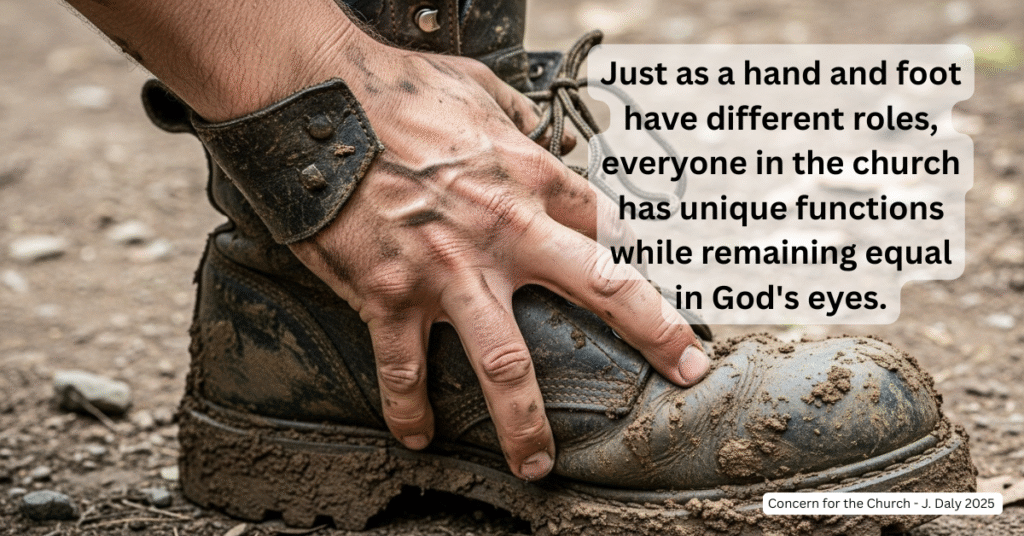Understanding Equality and Distinct Roles in the Body of Christ
In our pursuit of understanding God’s will for His church, we often encounter discussions about equality and roles. It’s a conversation that can become confusing by modern perspectives if we don’t anchor ourselves firmly in the solid ground of Scripture.
The Heart of it All
At the heart of the Christian faith lies the profound truth of our equality in Christ. As the Apostle Paul declared in Galatians 3:28, our identities as male or female, Jew or Gentile, slave or free, dissolve into our unified identity in Christ Jesus. We are all equally loved, equally redeemed, and equally partakers of God’s grace.

However, this glorious equality in salvation doesn’t erase the reality of distinct roles within the body of Christ. Think of the human body – a marvel of interconnectedness where every part is essential. Yet, would we expect a hand to perform the function of a foot? Of course not. A hand cannot do the work of a foot, and neither should we expect uniformity of function within the church simply because we are equal in God’s eyes.
This isn’t a matter of superiority or inferiority;
The Bible, when approached with a commitment to exegesis – drawing out its original meaning – reveals a purposeful design for the church, which includes different roles for men and women. This isn’t a matter of superiority or inferiority; it’s a reflection of God’s wisdom in creating us with unique gifts and callings that complement one another.
Danger
The danger arises when we succumb to eisegesis, reading our contemporary ideas about gender roles into the ancient text. We must be careful not to let our cultural context dictate our interpretation of Scripture. Instead, we must humbly submit to the authority of God’s Word, allowing it to shape our understanding.
We must be careful not to let our cultural context dictate our interpretation of Scripture
Embracing the biblical understanding of distinct roles is not a denial of equality; it’s an affirmation of God’s wise and beautiful order. Just as different instruments in an orchestra contribute their unique sounds to create a harmonious symphony, so too does the church thrive when its members embrace their God-given roles, working together for the common good and the glory of God.
Truth
Let us therefore be guided by the unchanging truth of Scripture, recognizing that while we are all equal in Christ, we are also uniquely gifted and called to serve in different capacities. This understanding allows the church to function as God intended – a vibrant, diverse body where every member plays a vital role in fulfilling His purpose.
Discernment
In a final thought, let us remember that discerning our calling is not about what we feel, but about what the Word of God reveals. While women are uniquely gifted and called to serve in countless vital capacities, we must test all desires and cultural trends against the clear authority of Scripture.
The office of elder is a specific role with qualifications that the Bible, in passages like 1 Timothy 2:12-14, is reserved for men.
True service is found not in fulfilling our own aspirations, but in humbly submitting our gifts to the biblical pattern for the church, trusting that God’s design is both good and perfect for the building up of His body.
Understanding 1 Timothy 2:12-14: A Timeless Principle
1 Timothy 2:12-14 is a significant passage that has been a subject of extensive discussion and debate within Christianity. While some interpret it as a specific instruction for a local, first-century church in Ephesus, a careful reading reveals that Paul’s reasoning is rooted in foundational, timeless biblical principles rather than transient cultural practices.
God used Paul as a divinely-inspired instrument to establish the Church. It would be highly unusual for a major instruction from such an inspired source to be confined to one specific time and place. Paul’s authority wasn’t just for his immediate audience; it was for all believers, a truth validated by the Holy Spirit’s role in guiding his writings.
Paul’s Appeal to Creation, Not Culture
The strongest evidence for the timeless nature of this passage is Paul’s appeal to the Genesis account. When Paul writes, “For Adam was formed first, then Eve, ‘he isn’t referencing a local Ephesian custom.‘ He’s grounding his instruction in the pre-Fall order of creation established by God Himself. This isn’t about an educational deficit in Ephesus or a problem with specific disruptive women; it’s about the divine order of male and female roles from the very beginning.
Similarly, when Paul refers to the Fall—”And Adam was not the one deceived; it was the woman who was deceived and became a sinner”—he is not pointing to a cultural failing but to the spiritual and theological implications of the first sin. He is highlighting the significance of the man’s headship and the woman’s role in the original transgression as a theological basis for his command regarding teaching and authority in the church. This reasoning transcends any single culture and applies to the whole of humanity.
The Distinction Between Roles and Worth
It is vital to understand that this passage does not imply that women are inferior to men. In Christ, men and women are equally valuable, equally saved, and equally gifted by the Holy Spirit. Galatians 3:28 famously states, “There is neither Jew nor Gentile, neither slave nor free, nor is there male and female, for you are all one in Christ Jesus.” This verse speaks to our spiritual standing and salvation, where all are equal before God.
However, 1 Timothy 2 and other passages (like 1 Corinthians 11 and Ephesians 5) speak to distinctions in roles and function within the church and the home. Just as the Father and Son are equal in deity yet have distinct roles in the Godhead, men and women are equal in worth yet have distinct, God-given roles that complement one another for the proper functioning and health of the church. This is the core of the “complementarian” view—that male and female roles are designed by God to be different but complementary.
The Harmony of Scripture
Finally, viewing 1 Timothy 2:12-14 as a universal principle aligns with the broader testimony of Scripture.
- The Old Testament priestly and kingly lines were exclusively male.
- Jesus chose 12 male apostles to establish the leadership of the New Covenant Church.
- The qualifications for elders and overseers in 1 Timothy 3 and Titus 1 are explicitly directed to men.
While women like Priscilla and Phoebe were essential partners in ministry, their roles did not involve the final authoritative teaching and leadership over the gathered congregation that Paul describes here.
Therefore, we can confidently and lovingly affirm this passage as God’s timeless design for the church. It’s not a cultural artifact but a divine principle intended for the health and order of the Body of Christ in all places and at all times.
-True service is found not in fulfilling our own aspirations –

